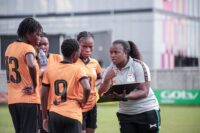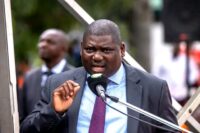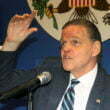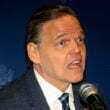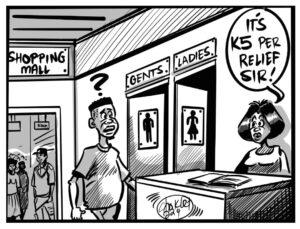American Ambassador to Zambia Daniel Foote says the Zambians government has been carrying out a number of financial transactions in the recent past which lack transparency, adding that should the American government discover that its donor aid to Zambia is also being misappropriated, hard action will be taken without hesitation.
And Ambassador Foote says he has tried to tell President Edgar Lungu and UPND leader Hakainde Hichilema to sit and have a conversation on how they can united Zambia which is politically divided, but he has not succeeded.
Meanwhile, the US envoy used his courtesy call on Kabwe Diocese Bishop Clement Mulenga to share his upbringing as a naughty child from upstate New York, and how he doesn’t like to be treated like such a big deal because of his revered diplomatic title.
And Speaking at Mulungushi University when he gave a public lecture to students on, “Harnessing the Constructive Energy of Zambia’s Youth: Issues, Possibilities and challenges”, Foote said the Zambian government has been making financial transactions that lack transparency.
“One thing that I would like Zambia do, is to be more transparent in its financial transactions. You can go on our websites and find out where every dollar of US assistance comes from and goes to. In recent years, Zambia has made a lot of financial transactions with private and public sector actors; and I think, it would be in the people’s best interests and Zambia’s markets’ best interest to be fully transparent about where this money has come from; where it needs to be repaid and where it’s going,” Ambassador Foote said.
He said corruption was a drain on government coffers and robbed the people of the much needed services.
“Corruption robs the people most in need of government services of those services by having corrupt individuals in institutions who self-enrich themselves. It promotes crime, violence and instability,” he said.
And responding to a question raised during the question and answer segment on the US government’s position on donor funds that have been misappropriated, the US envoy said the US government was still assessing the situation but warned that the American government would not hesitate to take stern action if it learns of funds being misappropriated in the projects it is supporting.
“The US support to Zambia alone is in excess of US$400 million per year. We on a regular basis take a hard look at all our programmes; and any management controls and vulnerabilities that we may have across Zambia. But at this point we have not decided to freeze aid to Zambia, nor is it on my immediate windshield to freeze aid to Zambia. Now that having been said, if we find that US money is being misappropriated, then we will have to take a hard stance on our aid to Zambia,” Ambassador Foote said.
During a meeting at Bishop Mulenga’s office in Kabwe earlier yesterday, Ambassador Foote said he was brought up by Christian parents who sent him to a sister’s convent for moulding whenever he became naughty at home.
“My aunt was a sister of the Franciscan Order, so whenever I misbehaved, my mother would send me to the convent for the afternoon and all the sisters would help me to learn how to better behave. I can’t say that I have been a wonderful catholic in many years; I do go to church twice a year and that’s probably not very much. But I do talk to the big man upstairs privately very often,” he said.
“It’s wonderful for me to come and see you, and despite my title, I don’t consider that and I don’t feel like I am big deal. I don’t like to be treated like I am a big deal. I am just a regular bonehead from upstate New York who has been very lucky throughout his life.”
Ambassador Foote noted that Zambia was politically divided, but he had failed to get the top political rivals to dialogue, joking that he was not a good marriage counsellor.
“I met some of your colleagues from Chipata, Mpulungu and I think that a lot of work that the church is doing is wonderful. I think you guys are well placed to help me understand the situations in some of the communities and cities here and Lusaka. That’s one of the main reasons for this courtesy call. I am here to get a sense for the social situation, the economic situation and the challenges you think are faced here,” he said.
“The church has long been a voice of reason and a broker and liaison politically here in Zambia. And I know there has been conversation, we have talked about political dialogue for over two years now. I told both the President and HH that I would love to see them have dialogue but I got to tell you I don’t think I’m a good marriage counsellor so hopefully they will and we will get them together at some point in time but that more up to them that it’s up to us. I just wonder how you feel, I understand Central Province and Kabwe, like much of the country is sort of divided politically. Is that the case?”
In responce, Bishop Mulenga said it was unfortunate that President Lungu and HH did not want to dialogue despite many calls
“That is the truth yes. We pray for peace in our country, we pray for our two leaders and indeed for all the political leaders that we have in our country. We pray for them because what we desire is to have peace and of course peace is not just the absence of war and all that No! but it also involves progress in the lives of our people. We try by all means to see how we can help this political [dialogue] processes. Especially between the two leaders, the President of Zambia Mr Edgar Changwa Lungu and HH; because we know that at the moment these are the two outstanding leaders that we have anyway, politically speaking. The two parties that is the PF and UPND are the biggest parties that we have at the moment and that is the truth that cannot be refuted by anybody. So, if these two can come together and reconcile and we are talking about true reconciliation, we can say that probably that can be the starting point towards having true peace,” Bishop Mulenga said.
At that point Ambassador Foote interjected with a contribution to say that no one could succeed to get the two leaders to dialogue if they both don’t value doing so.
“Its actually about the both of them. The church, Civil Society, ZCID, the US Embassy, the Chinese Embassy, the pope, the Baroness of Scotland, everybody can try to get involved in this process but at the end of the day they are the two guys who need to sit down and have a conversation,” said Ambassador Foote.
Concluding the meeting, Bishop Mulenga said there was need for the National Day of Prayer to be met with action.
“I mean the bow is in their court for sure. Its like people are saying tomorrow we are going to have our day of National prayer and reconciliation and fasting, but we can pray its true and we should pray all the time its should not just be tomorrow. But at the same time, prayer alone may not achieve peace. There is always need for action. Concrete action not just prayer no! prayers will be empty, and God may not even listen to us if we do not act. Yes, Prayer is important yes but where is the action?” he wondered.





